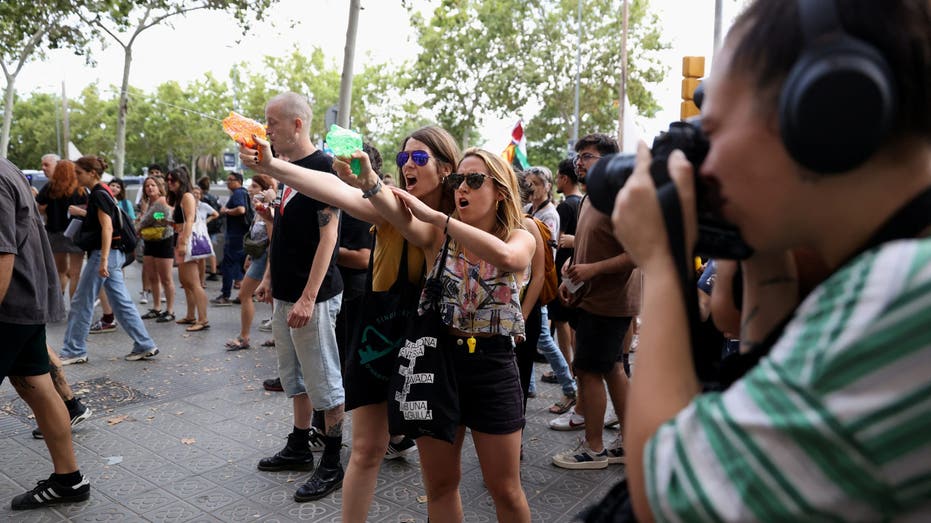Residents of Barcelona took out their frustrations against the increased mass tourism by visiting popular spots around the city this weekend and spraying people with water guns, demanding they go home.
“Enough, let’s put limits on tourism,” was another rallying cry for the thousands of people – around 2,800, according to Catalan News – who turned up on Saturday evening at the city center and started marching around to major tourist hot spots in the city.
Organizers claimed that the protest provided an outlet for the “discomfort that exists in Barcelona” regarding increased mass tourism, which local officials have blamed for higher cost of living and housing, making it difficult for locals to live in the city.
Neighborhood associations, housing activists and ecologists joined the gathering and argued that “enormous negative impacts” to employment, society and the environment have made it “impossible” for locals to live in Barcelona.
THREE DEAD AFTER TOURIST PANE CRASHES ON FRENCH HIGHWAY: VIDEO
Euronews reported that the organizers have also claimed that the rising number of tourists – around 12 million people a year, many arriving via cruise ship – has also put pressure on health services, waste management and water supplies.
Barcelona’s Mayor Jaume Collboni announced a plan to eliminate all of the city’s roughly 10,000 short-term rentals by 2028, but the housing activists argue that the legislation will pave the way for more hotels instead.
SAFEST DESTINATIONS FOR A SOLO TRAVELER: TOKYO, STOCKHOLM AND OTHER MEMORABLE VACATION SPOTS
Barcelona serves as the latest major European tourist destination to complain about the increased tourism and the wear and tear the city has to bear under such demands.
On the Canary Islands, just off the coast of Africa but owned by Spain, activists have gone on a hunger strike to prevent the building of new hotels, the BBC reported. The organizers abandoned the protest after 20 days, determining that officials had “zero interest” in their well-being, but construction briefly halted due to concerns over environmental breaches.
‘PERSONAL HERITAGE JOURNEYS’ BRING TRAVELERS MUCH CLOSER TO THEIR FAMILY’S STORIES
Residents have urged the government to abandon its plans to expand hotel building across the islands, with slogans reminding them that “people live here” and that they “don’t want to see our island die.”
Florence, Italy, last year announced a ban on new short-term rentals, which it defines as properties that have an occupancy for less than 30 days for any single occupant. Mayor Dario Nardella last year acknowledged the law would face resistance, but he believed it was fully and legally defensible, The Associated Press reported.
2 OF THE MOST BEAUTIFUL GARDENS IN THE WORLD ARE IN THE US, THE OTHERS SCATTERED ACROSS THE GLOBE
Nardella at the time argued locals had found themselves living in “apartment hotels” as the city saw the total apartments available on Airbnb surging from 6,000 to over 14,000 in just five years. The city would not vacate the 8,000 listings in the city center but would look to convert when possible.
Venice, Italy officials upset locals by introducing a 5 euro “day-tripper” entry fee to the city center, with advocates arguing that the fee does little to disincentivize visitors and simply fills the city coffers while the available supply of apartments remains limited.
CLICK TO GET THE FOX NEWS APP
“It is a further advance toward the Venice that we do not want, the ‘museum city,’ a step toward the normalization of this image, which is all the more dangerous the more it enters the international imagination,” Susanna Polloni, from the Venice-based Solidarity Network for Housing, told reporters.
“This measure will help make it even more concretely real,” Polloni continued. “A city empty of residents and soul, given that the tourist monoculture is now devouring everything needed for the life of a city: housing, protected employment, public services, neighborhood shops and crafts.”
Source
